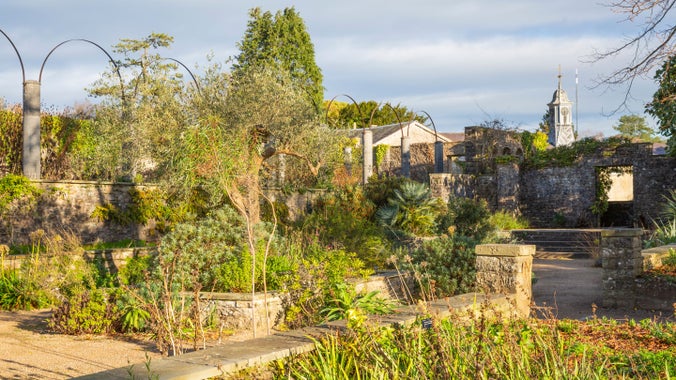
Discover more at Dyffryn Gardens
Find out when Dyffryn Gardens is open, how to get here and what there is to see and do on your visit.

On the outskirts of Cardiff, discover more than 55 acres of horticultural variety, including grand historical vistas, a magical arboretum, intimate garden rooms, working kitchen gardens, an exotic glass house and two log stack play areas. During your visit, stop by our delightful café and beautifully curated shop to pick out some treats.
It may be winter, but the gardens at Dyffryn are anything but bleak. At this time of year the aromas of scented shrubs including Christmas box, winter sweet and winter honeysuckle fill the chilly air. Discover more delicate scents from sarcococca, chimonanthus and hamamelisna as you head around the gardens on a winter wander.
Look out for early snowdrops. You'll often find them tucked under trees alongside clusters of hellebores dotted around the gardens. Other winter flowering plants to look out for include camellia and cyclamen.
Inside the heated glasshouse, you'll find orchids, bromeliads and aloes flowering in an oasis of colour and warmth, in contrast to the cold weather outside.

The bare forms of deciduous trees and spectacular bark come to the fore in the winter. The great spire of the dawn redwood in the Exotics Garden is a real favourite. And be sure to seek out the bright bark of the young birches on the Kennel Bank and the mottled cinnamon of stewartia stems in the Arboretum.
1 January
After the hectic energy which often accompanies the end of one year and the start of another, a quiet winter walk is a great way to look after your body and mind during the ongoing winter months.
Pick-up your winter wander leaflet from the Welcome Centre when you arrive, it has a full-site map of the gardens and all the most interesting sections of the garden during the winter are highlighted so you can easily find them. Features such as snowdrops, early crocuses, Christmas Box, and ornamental grass. The map also points out where you can find our Glasshouse for a warming taste of the tropical even in the heart of winter.
On the back of the leaflet you can learn a bit about what our gardeners are up to over the winter and what we need to do to prepare the gardens for the spring.


Find out when Dyffryn Gardens is open, how to get here and what there is to see and do on your visit.
John Cory built the house and gardens at Dyffryn on the wealth he accumulated from his exploits in the coal industry.

Enjoy hearty dishes and light snacks at the café with a tasty treat to round off your visit. Pop into the shop to pick up something special to take home.

Take a look at the map of Dyffryn Gardens to help plan your visit.
Visit Dyffryn Gardens as a group and enjoy discounted entry fees.

Find out how you can get involved at Dyffryn Gardens and explore the different opportunities available.
